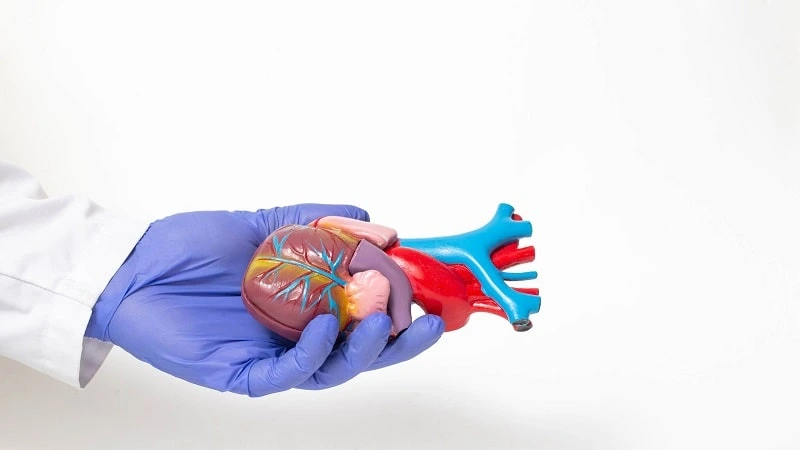Kidney disease and heart failure are two serious medical conditions that affect millions of people worldwide. The intricate relationship between these two conditions has garnered increasing attention in the medical community. Kidney disease refers to the impaired functioning of the kidneys, leading to the accumulation of waste products and fluid imbalances in the body.
On the other hand, heart failure occurs when the heart’s pumping capacity becomes weakened, resulting in inadequate blood circulation throughout the body. Although kidney disease and heart failure are distinct conditions, they often coexist and influence each other’s progression and outcomes.
This article aims to explore the link between kidney disease and heart failure, shedding light on the shared risk factors, underlying mechanisms, clinical implications, and potential interventions. Understanding this intricate connection is crucial for providing comprehensive care to patients and improving their overall health outcomes.
What is Kidney Disease?
Kidney disease, characterized by impaired kidney function, encompasses a range of the conditions that can have significant implications for overall health. Understanding the different aspects of kidney disease is essential for recognizing its impact on individuals and managing their care effectively.
Definition and Types
Kidney disease, also known as renal disease, refers to any condition that disrupts the normal functioning of the kidneys. These vital organs play a crucial role in filtering waste products and excess fluid from the bloodstream, maintaining electrolyte balance, and producing hormones that regulate blood pressure.
There are several types of kidney disease, including:
- Chronic Kidney Disease (CKD): This is a progressive condition in which kidney function declines over time. CKD is typically categorized into stages based on the estimated glomerular filtration rate (eGFR) and the presence of kidney damage.
- Acute Kidney Injury (AKI): Also known as acute renal failure, AKI is a sudden and severe decrease in kidney function. It can occur due to various factors, such as dehydration, medication toxicity, or reduced blood flow to the kidneys.
- Polycystic Kidney Disease (PKD): This genetic disorder causes the growth of cysts in the kidneys, leading to their enlargement and impaired function.
- Glomerulonephritis: This refers to inflammation of the glomeruli, which are tiny filters within the kidneys. Glomerulonephritis can be caused by infections, autoimmune diseases, or certain medications.
Read More: Drawbacks of Smoking on An Empty Stomach
Causes and Risk Factors
Kidney disease can arise from various causes and risk factors, including:
- Diabetes: High blood sugar levels can damage the blood vessels in the kidneys, affecting their function.
- Hypertension: Persistent high blood pressure can strain the blood vessels in the kidneys, impairing their ability to filter waste.
- Family History: Genetic factors can increase the risk of developing certain kidney diseases, such as PKD.
- Age: The risk of kidney disease generally increases with age.
- Smoking: Smoking can damage blood vessels and worsen kidney function.
- Obesity: Excessive weight puts strain on the kidneys and can contribute to the development of kidney disease.

Common Symptoms and Diagnostic Methods
The symptoms of kidney disease may vary depending on the underlying cause and the stage of the condition. Some common symptoms include:
- Fatigue and weakness
- Swelling in the legs, ankles, or feet
- Changes in urination patterns, such as increased frequency or decreased urine output
- Blood in the urine
- Persistent itching
- Nausea and vomiting
Read More: How to Reverse Adrenal Fatigue Naturally: A Comprehensive Guide
To diagnose kidney disease, healthcare providers may utilize several diagnostic methods, including:
- Blood Tests: These tests assess kidney function by measuring levels of waste products, electrolytes, and creatinine in the blood.
- Urine Tests: Urine samples can provide information about kidney damage, protein leakage, or the presence of infection.
- Imaging Tests: Imaging techniques like ultrasound, CT scans, or MRIs can help visualize the structure of the kidneys and detect any abnormalities.
- Kidney Biopsy: In some cases, a small sample of kidney tissue may be obtained for microscopic examination to determine the underlying cause of kidney disease.
Impact of Kidney Disease on Overall Health
Kidney disease can have far-reaching effects on overall health and well-being. As kidney function declines, waste products, fluid, and electrolyte imbalances can accumulate in the body, leading to complications such as:
- Cardiovascular Disease: Kidney disease increases the risk of developing heart disease, heart attacks, and strokes.
- Anemia: Impaired kidney function can result in decreased production of red blood cells, leading to anemia.
- Bone Health Problems: Kidney disease can disrupt the balance of minerals in the body, which can weaken the bones and increase the risk of fractures.
- Fluid Retention: The kidneys’ ability to regulate fluid balance becomes compromised in kidney disease, leading to swelling and edema.
What is Heart Failure?
Heart failure is a serious medical condition that occurs when the heart’s pumping capacity is compromised, leading to inadequate blood circulation throughout the body. Gaining a comprehensive understanding of heart failure is vital for recognizing its symptoms, identifying its underlying causes, and implementing appropriate treatment strategies.
Definition and Types
Heart failure, also known as congestive heart failure, is a condition characterized by the heart’s inability to pump enough blood to meet the body’s demands. It can be categorized into two main types:
- Systolic Heart Failure: This type of heart failure occurs when the heart muscle becomes weak and is unable to contract with sufficient force during each heartbeat. As a result, the heart’s pumping efficiency is reduced.
- Diastolic Heart Failure: In diastolic heart failure, the heart muscle becomes stiff and loses its ability to relax properly during the resting phase between heartbeats. This stiffness impairs the heart’s ability to fill with an adequate amount of blood.
Causes and Risk Factors
Heart failure can arise from various causes and risk factors, including:
- Coronary Artery Disease (CAD): The most common cause of heart failure, CAD refers to the narrowing or blockage of the coronary arteries that supply blood to the heart muscle.
- High Blood Pressure (Hypertension): Prolonged elevation in blood pressure can strain the heart and weaken its pumping ability over time.
- Previous Heart Attack: A heart attack can damage the heart muscle, leading to impaired pumping function and subsequent heart failure.
- Cardiomyopathy: This term encompasses various diseases that directly affect the heart muscle, weakening its ability to pump blood effectively.
- Heart Valve Problems: Malfunctioning heart valves, such as those affected by stenosis or regurgitation, can contribute to heart failure.
- Arrhythmias: Irregular heart rhythms, including atrial fibrillation, can disrupt the heart’s pumping function and increase the risk of heart failure.

Common Symptoms and Diagnostic Methods
Heart failure can present with a range of symptoms that may vary in severity and manifestation. Common symptoms include:
- Shortness of breath, especially during exertion or when lying flat
- Fatigue and weakness
- Persistent coughing or wheezing
- Fluid retention, leading to swelling in the legs, ankles, or abdomen
- Rapid or irregular heartbeat
- Reduced ability to exercise
Read More: How to Combat Fatigue from Antibiotics: Restoring Energy During Treatment
To diagnose heart failure, healthcare providers may employ several diagnostic methods, including:
- Physical Examination: A thorough evaluation of symptoms, medical history, and physical signs, such as abnormal heart sounds or fluid retention.
- Echocardiogram: This ultrasound test provides detailed images of the heart’s structure and function, allowing the assessment of heart muscle strength, chamber sizes, and valve function.
- Electrocardiogram (ECG): By recording the heart’s electrical activity, an ECG can identify abnormal rhythms and detect any signs of heart damage.
- Blood Tests: These tests measure specific markers in the blood that indicate heart stress or damage, such as brain natriuretic peptide (BNP) or troponin levels.
- Cardiac Catheterization: In some cases, a thin tube is inserted into the heart to measure pressures within the heart chambers and assess the presence of blockages in the coronary arteries.
Impact of Heart Failure on Overall Health
Heart failure can significantly impact a person’s overall health and quality of life. When the heart’s pumping function is compromised, various complications can arise, including:
- Reduced Exercise Tolerance: As the heart’s ability to pump blood efficiently diminishes, individuals with heart failure may experience limitations in physical activity and exercise capacity.
- Fluid Accumulation: Heart failure can result in fluid retention, leading to swelling in the extremities (edema) and fluid buildup in the lungs (pulmonary edema), causing shortness of breath.
- Organ Dysfunction: In severe cases, heart failure can impair the function of other organs, such as the kidneys, liver, and digestive system.
- Increased Risk of Cardiac Events: Heart failure predisposes individuals to a higher risk of heart attacks, arrhythmias, and sudden cardiac death.
- Impact on Mental Health: Living with heart failure can cause emotional distress, anxiety, and depression.
The Interplay between Kidney Disease and Heart Failure
Kidney disease and heart failure often coexist and have a complex interplay, influencing each other’s progression and outcomes. Understanding the relationship between these two conditions is crucial for providing comprehensive care and improving patient outcomes.
Shared Risk Factors and Underlying Mechanisms
Kidney disease and heart failure share several common risk factors, contributing to their coexistence:
- Hypertension: High blood pressure is a significant risk factor for both kidney disease and heart failure. The strain placed on the blood vessels can damage the kidneys and weaken the heart muscle over time.
- Diabetes: Chronic kidney disease and heart failure are frequently observed in individuals with diabetes. Elevated blood sugar levels can lead to kidney damage (diabetic nephropathy) and weaken the heart muscle (diabetic cardiomyopathy).
- Obesity: Excess weight increases the risk of developing both kidney disease and heart failure. Obesity contributes to inflammation, insulin resistance, and increased workload on the heart and kidneys.
- Aging: The prevalence of both kidney disease and heart failure increases with age, as the physiological changes associated with aging affect the function of both organs.
The interplay between kidney disease and heart failure involves several underlying mechanisms:
- Hemodynamic Alterations and Fluid Retention: Impaired kidney function in kidney disease leads to the retention of sodium and water, resulting in fluid overload. This fluid overload increases the workload on the heart, leading to cardiac remodeling and decreased cardiac output.
- Neurohormonal Activation and Systemic Inflammation: Both kidney disease and heart failure involve the activation of neurohormonal systems, such as the renin-angiotensin-aldosterone system (RAAS) and the sympathetic nervous system. This activation contributes to fluid retention, vasoconstriction, and inflammation, which further exacerbate both conditions.
- Renal-Cardiac Syndrome: Renal-cardiac syndrome describes the bidirectional relationship between kidney disease and heart failure. It encompasses five subtypes, each characterized by specific mechanisms and clinical manifestations. These subtypes include acute cardiorenal syndrome, chronic cardiorenal syndrome, acute renocardiac syndrome, chronic renocardiac syndrome, and secondary cardiorenal syndrome.

Prevalence and Incidence Rates of Coexisting Kidney Disease and Heart Failure
The coexistence of kidney disease and heart failure is prevalent and has significant implications:
- Prevalence: Studies have shown a high prevalence of kidney disease among heart failure patients, with estimates ranging from 30% to 60%. Similarly, the prevalence of heart failure among individuals with kidney disease is considerably higher compared to the general population.
- Incidence Rates: The incidence rates of developing kidney disease in individuals with heart failure and vice versa are also notable. Patients with heart failure are at an increased risk of developing kidney disease, while individuals with kidney disease have a higher likelihood of developing heart failure compared to those without kidney disease.
Read More: How Often Should You Switch Chest Compressors to Avoid Fatigue?
Impact on Prognosis and Treatment Outcomes
The coexistence of kidney disease and heart failure has significant implications for prognosis and treatment outcomes:
- Increased Morbidity and Mortality: The presence of kidney disease in heart failure patients is associated with worse outcomes, including increased hospitalizations, higher mortality rates, and reduced quality of life. Similarly, kidney disease patients with heart failure have a higher risk of cardiovascular events and mortality compared to those without heart failure.
- Implications for Medications and Treatment Approaches: Kidney disease can affect the pharmacokinetics and pharmacodynamics of medications commonly used to treat heart failure. Dosing adjustments and careful medication selection are necessary to avoid further kidney damage or adverse effects. Additionally, optimizing fluid balance and managing comorbidities are crucial considerations in the treatment of individuals with both kidney disease and heart failure.
- Need for Multidisciplinary Care: The management of coexisting kidney disease and heart failure requires a multidisciplinary approach, involving collaboration among nephrologists, cardiologists, and other healthcare providers. Close monitoring of kidney function, fluid status, and medication management is essential for improving patient outcomes.
Pathophysiology and Mechanisms
The pathophysiology of the interplay between kidney disease and heart failure involves intricate mechanisms that contribute to the progression and worsening of both conditions. Understanding these underlying processes is crucial for effectively managing patients with coexisting kidney disease and heart failure.
Hemodynamic Alterations:
- In kidney disease, impaired renal function leads to decreased filtration of waste products and sodium retention. This results in fluid overload and increased blood volume.
- The increased blood volume places an additional burden on the heart, leading to cardiac remodeling, increased cardiac workload, and eventual weakening of the heart muscle.
- In heart failure, reduced cardiac output and impaired pumping function contribute to inadequate perfusion of the kidneys, leading to renal hypoperfusion and further kidney damage.
Neurohormonal Activation:
- Both kidney disease and heart failure involve the activation of neurohormonal systems, such as the renin-angiotensin-aldosterone system (RAAS) and the sympathetic nervous system.
- In kidney disease, the activation of RAAS is triggered by decreased renal blood flow and sodium retention. This results in vasoconstriction and fluid retention, further compromising cardiac function.
- Similarly, in heart failure, neurohormonal activation occurs as a compensatory mechanism to maintain blood pressure and perfusion. However, prolonged activation of these systems leads to fluid overload, vasoconstriction, and inflammation, worsening kidney function.
Inflammation and Oxidative Stress:
- Chronic inflammation and oxidative stress play a significant role in the progression of both kidney disease and heart failure.
- In kidney disease, inflammation contributes to renal fibrosis, glomerular damage, and impaired renal function.
- In heart failure, inflammation promotes cardiac remodeling, fibrosis, and contractile dysfunction.
- The interplay between inflammation and oxidative stress in both conditions creates a vicious cycle, further exacerbating the damage to the heart and kidneys.
Renal-Cardiac Cross Talk:
- The bidirectional communication between the kidneys and the heart, often referred to as renal-cardiac cross-talk, further influences the progression of kidney disease and heart failure.
- Impaired kidney function affects fluid and electrolyte balance, leading to fluid overload, hypertension, and increased cardiac workload.
- In turn, reduced cardiac output and inadequate perfusion compromise renal blood flow, impairing renal function and contributing to kidney damage.
Comorbidities and Shared Risk Factors:
- Kidney disease and heart failure often share common risk factors, such as hypertension, diabetes, obesity, and aging.
- These shared risk factors contribute to the development and progression of both conditions and increase the likelihood of their coexistence.
- Comorbidities, such as diabetes and hypertension, can directly contribute to renal damage and heart dysfunction, exacerbating the interplay between the two conditions.
Read More: What Causes Heartburn in Acid Reflux; A Disease Leading to Cancer
Clinical Implications
The interplay between kidney disease and heart failure has significant clinical implications, affecting the diagnosis, management, and prognosis of individuals with coexisting conditions. Understanding these clinical implications is crucial for providing comprehensive care and optimizing patient outcomes.
Diagnosis and Screening:
- Recognizing the association between kidney disease and heart failure is important for early detection and timely intervention.
- Healthcare providers should be vigilant in screening individuals with one condition for the presence of the other. This includes assessing kidney function and performing cardiac evaluations, such as echocardiograms and electrocardiograms, in patients with kidney disease, and vice versa.
- Coexisting kidney disease and heart failure may present with overlapping symptoms, such as fluid retention and fatigue. Therefore, a comprehensive evaluation is necessary for accurate diagnosis and appropriate management.
Treatment Considerations:
- Coexisting kidney disease and heart failure require a multidisciplinary approach to treatment, involving collaboration between nephrologists, cardiologists, and other healthcare providers.
- Medication selection and dosing adjustments should take into account the impact of impaired kidney function on drug metabolism and elimination.
- Optimizing fluid balance is crucial in the management of both conditions. Careful monitoring of fluid status, including assessing for fluid overload and congestion, is necessary to prevent exacerbations of heart failure and further kidney damage.
- Lifestyle modifications, including dietary changes, sodium and fluid restriction, and weight management, play a vital role in the management of both kidney disease and heart failure.
Management of Comorbidities
- Individuals with coexisting kidney disease and heart failure often have additional comorbidities, such as hypertension and diabetes.
- Aggressive management of these comorbidities is essential to prevent further damage to the heart and kidneys. This includes optimizing blood pressure control, glycemic management, and lipid control.
- Lifestyle modifications, such as regular exercise and smoking cessation, should also be emphasized to reduce the risk of cardiovascular events and slow the progression of both conditions.
Prognostic Implications:
- The presence of kidney disease in heart failure patients and vice versa is associated with a worse prognosis and increased morbidity and mortality.
- Individuals with both conditions have a higher risk of cardiovascular events, hospitalizations, and reduced quality of life.
- Close monitoring of kidney function and cardiac parameters is necessary to identify changes and intervene early to prevent disease progression and complications.
Patient Education and Support:
- Providing education and support to patients with coexisting kidney disease and heart failure is crucial for self-management and adherence to treatment plans.
- Patients should be educated about the importance of medication adherence, dietary modifications, fluid restriction, and lifestyle changes.
- Emotional support and counseling should be offered to address the psychological impact of living with both conditions, including anxiety, depression, and concerns about prognosis.
Read More: Stent Removal After Kidney Transplant: Ensuring a Smooth Recovery
Prevention and Risk Reduction Strategies
Implementing prevention strategies and risk reduction measures is essential in mitigating the development and progression of both kidney disease and heart failure. By addressing modifiable risk factors and promoting healthy lifestyle choices, individuals can reduce their risk and improve their overall health outcomes.
Blood Pressure Management:
- Maintaining optimal blood pressure is crucial in preventing the development and progression of kidney disease and heart failure.
- Individuals should monitor their blood pressure regularly and work with healthcare providers to achieve and maintain target blood pressure levels.
- Lifestyle modifications, such as adopting a low-sodium diet, engaging in regular physical activity, and managing stress, can help lower blood pressure and reduce the risk of both conditions.
Diabetes Control:
- Effective management of diabetes is essential in preventing or slowing the progression of kidney disease and heart failure.
- Individuals with diabetes should closely monitor their blood sugar levels, adhere to prescribed medications, and follow a balanced diet.
- Regular follow-up with healthcare providers, including endocrinologists and primary care physicians, is important for ongoing diabetes management and risk reduction.
Weight Management:
- Maintaining a healthy weight through a balanced diet and regular physical activity is crucial in preventing the development of kidney disease and heart failure.
- Individuals should strive to achieve and maintain a body mass index (BMI) within the normal range.
- Implementing lifestyle changes, such as portion control, mindful eating, and regular exercise, can help individuals achieve weight management goals and reduce the risk of both conditions.
Smoking Cessation:
- Smoking is a significant risk factor for the development and progression of kidney disease and heart failure.
- Individuals should be encouraged to quit smoking and offered resources and support to aid in smoking cessation.
- Healthcare providers should emphasize the detrimental effects of smoking on both kidney and heart health and provide information on available smoking cessation programs and medications.
Regular Physical Activity:
- Engaging in regular physical activity has numerous benefits in preventing kidney disease and heart failure.
- Individuals should aim for at least 150 minutes of moderate-intensity aerobic exercise or 75 minutes of vigorous-intensity aerobic exercise per week, in addition to muscle-strengthening activities.
- Healthcare providers should provide guidance on appropriate exercise regimens based on individual health conditions and encourage patients to incorporate physical activity into their daily routines.
Healthy Diet:
- Adopting a healthy, balanced diet is crucial in preventing kidney disease and heart failure.
- Individuals should consume a variety of fruits, vegetables, whole grains, lean proteins, and low-fat dairy products.
- Limiting the intake of processed foods, saturated fats added sugars, and sodium is important in reducing the risk of both conditions.
Regular Health Check-ups:
- Regular health check-ups and screenings play a vital role in identifying early signs of kidney disease and heart failure.
- Individuals should undergo routine blood pressure checks, cholesterol screenings, and blood tests to assess kidney function.
- Healthcare providers should educate patients about the importance of regular check-ups and screenings and ensure timely referrals to specialists if needed.
Conclusion
The interplay between kidney disease and heart failure is a complex and intertwined relationship that significantly impacts patient health and outcomes.
Understanding the shared risk factors, underlying mechanisms, and clinical implications is essential for comprehensive management.
A multidisciplinary approach, involving collaboration among nephrologists, cardiologists, and other healthcare providers, is necessary to optimize patient care.
Emphasizing prevention strategies and risk reduction measures, such as blood pressure management, diabetes control, weight management, and lifestyle modifications, can help mitigate the development and progression of both conditions.
Ongoing research in areas like biomarkers, precision medicine, therapeutic interventions, telemedicine, lifestyle interventions, and health disparities holds promise for further advancements in prevention, diagnosis, and management.
By addressing the complexities of kidney disease and heart failure, healthcare professionals can improve patient outcomes and enhance the quality of life.
FAQs
Can kidney disease cause heart failure?
Yes, kidney disease can contribute to the development of heart failure. Impaired kidney function can lead to fluid overload and increased blood volume, putting an additional burden on the heart.
Can heart failure affect kidney function?
Yes, heart failure can impair renal blood flow and lead to inadequate perfusion of the kidneys, resulting in reduced kidney function.
What are the common risk factors for kidney disease and heart failure?
Common risk factors include hypertension, diabetes, obesity, aging, and smoking.
How are kidney disease and heart failure diagnosed?
Diagnosis involves a comprehensive evaluation, including assessment of kidney function, cardiac evaluations, imaging studies, and laboratory tests.
What treatment options are available for individuals with both kidney disease and heart failure?
Treatment involves a multidisciplinary approach, including medication management, fluid balance optimization, lifestyle modifications, and addressing comorbidities.
Can lifestyle changes improve the prognosis of kidney disease and heart failure?
Yes, lifestyle modifications such as adopting a healthy diet, regular exercise, smoking cessation, and weight management can improve outcomes and slow the progression of both conditions.
Are there any specific medications for individuals with coexisting kidney disease and heart failure?
Medications may be adjusted based on kidney function, and certain drugs may be prescribed to target shared pathways and mechanisms.
Can kidney disease and heart failure be prevented?
While not all cases can be prevented, managing modifiable risk factors such as blood pressure, diabetes, weight, and lifestyle choices can reduce the risk.
What is the prognosis for individuals with both kidney disease and heart failure?
The prognosis can vary depending on the severity of the conditions, response to treatment, and the presence of other comorbidities. Close monitoring and comprehensive care are crucial for improving outcomes.
Medical References
- National Kidney Foundation. (2021). Cardiovascular Disease & Chronic Kidney Disease. Retrieved from https://www.kidney.org/atoz/content/cardiovascular
- National Heart, Lung, and Blood Institute. (2021). Heart Failure. Retrieved from https://www.nhlbi.nih.gov/health-topics/heart-failure
- Ronco, C., McCullough, P., & Anker, S. D. (2020). Cardio-renal syndromes: report from the consensus conference of the Acute Dialysis Quality Initiative. European Heart Journal, 41(34), 4029-4046.
- Mullens, W., Damman, K., & Harjola, V. P. (2019). The use of diuretics in heart failure with congestion—a position statement from the Heart Failure Association of the European Society of Cardiology. European Journal of Heart Failure, 21(2), 137-155.
- Cao, Y., & Bansal, N. (2016). Co-occurrence of heart and kidney dysfunction: overview of prevalence, significance, and therapeutic implications. Cardiorenal Medicine, 6(3), 177-186.
- Upadhya, B., & Kitzman, D. W. (2019). Heart failure with preserved ejection fraction: emerging drug strategies. Current Heart Failure Reports, 16(3), 71-79.







